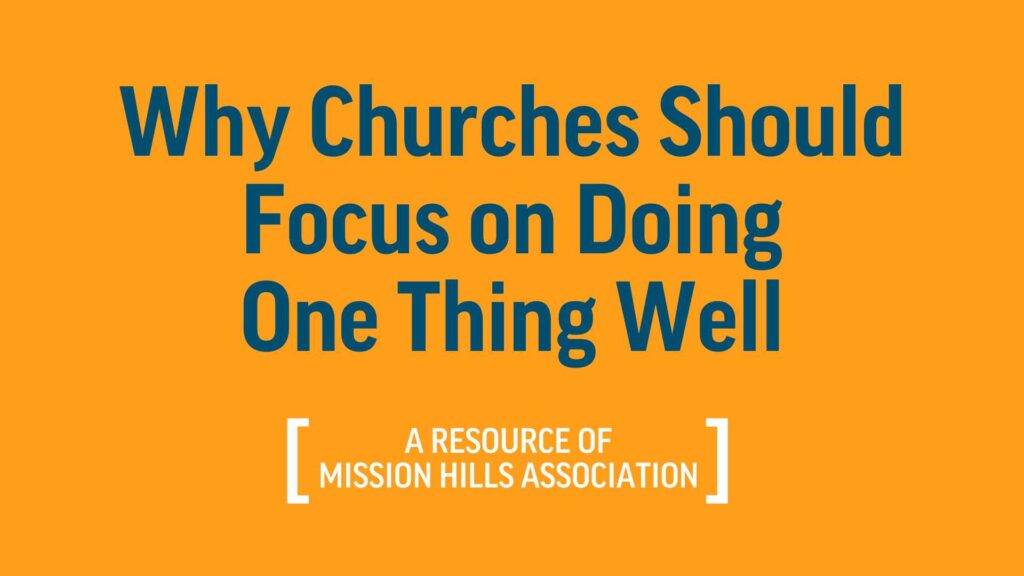
Did you know there are about 177,000 small churches across the U.S., each with around 60 worshipers on a typical Sunday? That might not sound like a lot, but these small congregations make up 59% of all churches and bring together a staggering 9 million people! It just goes to show how vital these small churches are to their communities.
And just like these small churches, administrative assistants may not be as seen, but they are the unsung heroes fueling church growth. Often working behind the scenes, these dedicated professionals are the backbone of church operations, playing a pivotal role in bringing the church’s mission to life and driving its success. The non-public nature of administrative work is a defining characteristic of the role. As Becky Skinner, the Next Gen Administrative Assistant at Mission Hills, aptly puts it, “It’s going to be a lot of unseen tasks, and you need to be okay with that. And it needs to be something that brings you joy.”
Although Skinner’s role is not the first role you think of serving in a church, it exemplifies the multifaceted nature of how a church operates. As Skinner explains, “There is the ministry of ministry and the work of ministry, and you can’t have the ministry part without the work. I love that what I do enables the pastors and ministers to do what they do best.”
With a servant’s heart, Skinner juggles a diverse array of responsibilities, including:
- Coordinating programs for toddlers to young adults.
- Managing complex logistical tasks like event planning and volunteer scheduling.
- Providing crucial support for the next-gen pastor’s initiatives.
This blend of practical skills and dedication to service enables Skinner to excel in her role and significantly contribute to the church’s growth and community impact.
The Role of the Administrator in Smaller Congregations
In smaller churches, the administrative role is often less formal and may be combined with other responsibilities. The pastor or other staff members may handle administrative duties in addition to their spiritual leadership roles. Even though these responsibilities may be passed around in smaller congregations, the administrator’s role becomes even more crucial. If time isn’t given to ensure that all the logistical aspects of the church are taken care of efficiently, the church may struggle to grow.
What Should a Church Administrator Be Responsible For?
For churches that aren’t in a position to have a person serve solely as an administrator, some changes can be made to streamline church systems so that crucial behind-the-scenes tasks don’t get pushed to the side.
Here are some practical tips to help streamline your church’s administrative tasks and ensure everything runs smoothly, even without a dedicated administrator:
- Tech is Your Friend: Implement an all-in-one church management system to automate and streamline tasks such as scheduling, communication, record-keeping, and financial management. This can reduce the administrative burden on staff and volunteers.
- Form Volunteer Committees or Teams: Form small groups to tackle different areas of church administration, such as finance, events, and facilities. After all, many hands make light work.
- Delegate Responsibilities: Delegate different tasks to your team based on their strengths. This can include roles such as finance management, event coordination, and facility maintenance.
- Learn and Grow Together: Set up some fun training sessions. It’s a great excuse for pizza while you learn together how to use that new church management software, balance the books, and effectively communicate.
- Outsource When Necessary: If no one on the team you’ve formed has experience handling the books, outsourcing might be best. It could save you headaches in the long run.
- Regularly Review and Adjust: At least annually, take a step back and see what’s working and what’s not. Reviewing administrative processes and making adjustments here and there can improve efficiency and effectiveness. Don’t forget to ask for feedback from your team and volunteers to find out where you can improve.
If you can afford to hire an administrator who focuses mainly on logistical and clerical work, it can significantly improve the ministry’s overall function.
Some responsibilities that might be given to a dedicated administrative assistant may include:
- Managing and delegating daily operations
- Handling (or outsourcing) finances, budgeting, and record-keeping
- Organizing functions and worship services
- Overseeing building upkeep
- Overseeing volunteers and employees
- Preparing and sending out communications for the congregation
A dedicated administrative assistant allows the pastor and other staff members to concentrate on leading the congregation. As Skinner puts it, “When you are stepping into a role like this, you need to want to be the person in the background.”
By embracing their essential behind-the-scenes role, church administrators like Skinner become the catalysts of church growth, empowering their church leaders to flourish. Their dedicated efforts weave a vibrant tapestry of faith, community, and growth that resonates far beyond the church walls, touching countless lives and nurturing a thriving spiritual ecosystem.
This article was written in collaboration with Becky Skinner, the Next Gen Administrative Assistant at Mission Hills. If you want to continue the conversation, you can contact her directly at bskinner@missionhills.org.




